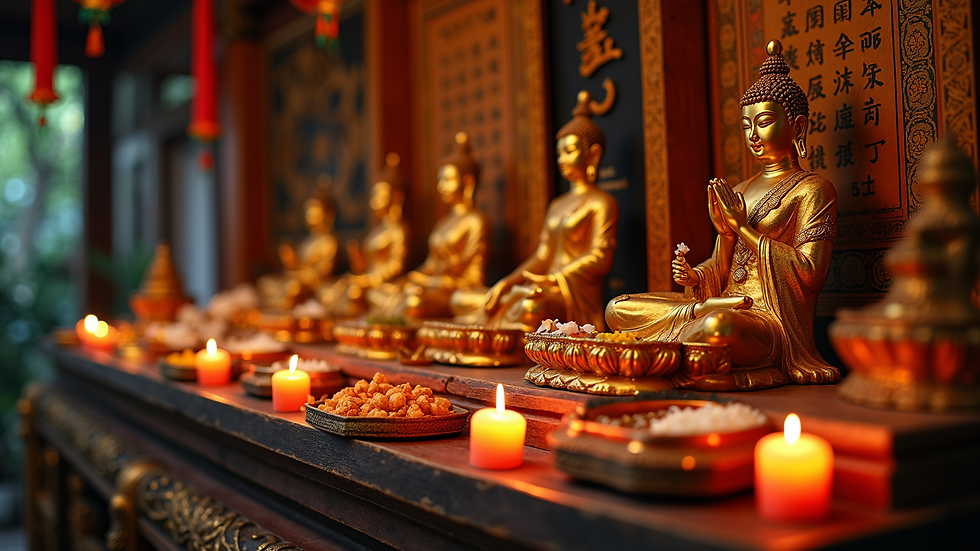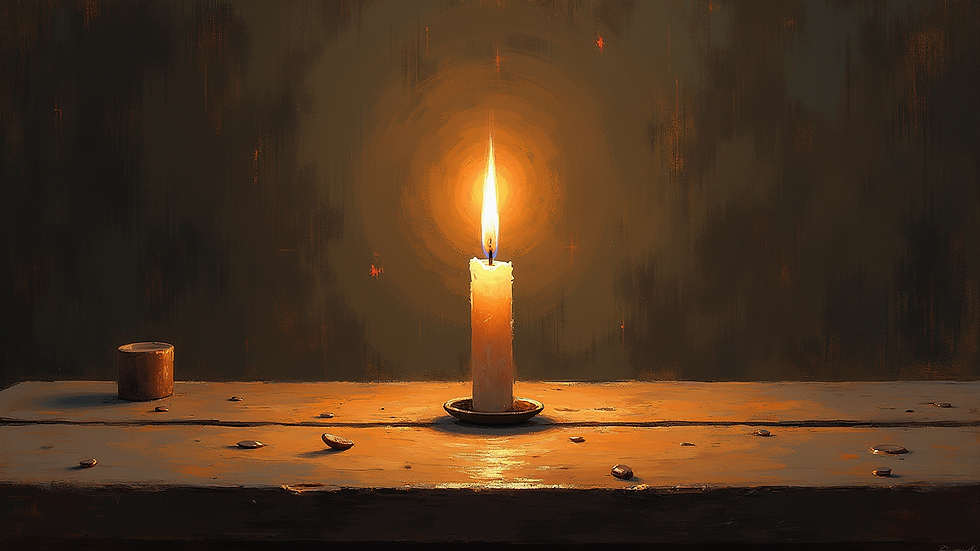The Afterlife in Asian Cultures
- PsychicUnderLord (Psychic)

- May 29
- 4 min read
Updated: Jun 4
The question of what happens after we die is one of humanity's oldest mysteries. Across various cultures, beliefs about the afterlife shape our understanding of life and death. In Asia, a rich array of traditions and philosophies outlines the journey of the soul after death. This post will explore the afterlife as seen through the lenses of Chinese, Japanese, Burmese, Vietnamese, Thai, and Hindu cultures, revealing both unique features and common themes.
The Afterlife in Chinese Culture
Chinese beliefs about the afterlife are deeply connected to Confucianism, Taoism, and Buddhism. Traditionally, it is believed that after death, the spirit continues to exist and must navigate challenges before reaching its final resting place.
The afterlife is often depicted as a parallel universe where the deceased undergo a trial reminiscent of a court hearing, overseen by the King of Hell, Yama. Families honor their ancestors with offerings like food and incense to ensure their well-being. Research shows that an estimated 80% of urban Chinese participate in traditional ancestor worship practices, such as the Ghost Festival (Zhongyuan Jie), where families honor deceased relatives, inviting them back home with food and other tributes.
Additionally, the soul can reincarnate into a new body based on karma accumulated in past lives. This cycle promotes a continual quest for self-improvement and spiritual growth.

In cities, traditional practices often blend with modern values. Many urban Chinese are reevaluating these age-old beliefs, creating a dialogue that respects both tradition and contemporary thought.
The Afterlife in Japanese Culture
Japanese views on the afterlife are influenced by Shinto and Buddhist beliefs, creating a rich perspective focused on nature, the impermanence of life, and ancestor reverence.
In Shinto, upon death, individuals enter Yomi, a land of the dead. Here, souls may linger until properly honored by living relatives. This view contrasts sharply with the judgment found in other cultural interpretations of hell, as Yomi is seen more as a resting place.
Buddhist beliefs propose reincarnation, where one's next life is determined by karma. Good deeds may lead to a favorable rebirth, while negative actions could hinder one's future existence. The ultimate goal is achieving Nirvana—an enlightened state beyond suffering.

The Obon festival is a significant event when families invite the spirits of their ancestors back home, emphasizing the connection between the living and the deceased. With globalization, many modern interpretations of these beliefs have emerged, creating a diverse understanding of life after death.
The Afterlife in Burmese Culture
Burmese culture holds strong Buddhist beliefs about the afterlife, emphasizing the concepts of rebirth and karma. The cycle of samsara—that is, the endless cycle of birth, life, death, and rebirth—forms the bedrock of their worldview.
Upon death, an individual's next life is shaped by their actions. Good karma may lead to positive circumstances, while bad deeds could result in struggles in the next life. Additionally, Nats (spirits) play an essential role in local traditions, with rituals that celebrate them and ensure their guidance for the living.
In Myanmar, the Thadingyut festival honors these Nats and promotes a sense of interconnectedness. Merit-making after a death is culturally significant, as families engage in acts of kindness to positively influence their loved one’s journey in the afterlife.
The Afterlife in Vietnamese Culture
Vietnamese beliefs about the afterlife draw from Confucianism, Taoism, and Buddhism, forming a complex system centered on ancestor worship. Upon death, souls are thought to traverse to the spirit world and require appeasement through rituals by their living relatives.
Preparing an altar with pictures, favorite foods, and incense is common in honoring the deceased. This practice allows families to reflect on their obligations toward their ancestors. The Vu Lan festival, celebrated nationwide, embodies this respect, emphasizing compassion and gratitude towards parental figures.
Overall, Vietnamese culture highlights karma and reincarnation, viewing the soul's journey as not just a passage but also a chance for growth and enlightenment.

The Afterlife in Thai Culture
In Thailand, the afterlife beliefs are primarily shaped by Theravada Buddhism, which underscores the cyclic nature of existence through karma and rebirth. Much like other cultures, actions in this life significantly impact future incarnations.
After death, the spirit wanders for a time, during which living relatives engage in merit-making, such as giving alms to support the deceased’s journey. Traditional Thai funerals include a rich array of rituals to facilitate a smooth transition. The body is bathed and dressed, while family members come together for prayers, fostering a sense of community during grief.

The Buddhist holiday Makha Bucha plays a pivotal role, encouraging people to reflect on their actions and live a life conducive to enlightenment.
In Thai culture, the Phi Ta Khon festival celebrates the spirits of ancestors, illustrating the ongoing connection between the living and the dead.
The Afterlife in Hindu Culture
Hinduism presents a detailed view of the afterlife, linking ideas of karma, dharma (duty), and the eternal nature of the soul. The journey of the atman, or soul, is central, believed to undergo a cycle of rebirth based on actions in previous lives.
Upon death, the soul faces judgment influenced by Yama, the deity of death. Outcomes may include Swarga (heaven) or Naraka (hell), based on one's deeds. Eventually, the soul seeks Moksha—liberation from rebirth, achieved through righteousness and spiritual practice.

Hindu funerary rites, or Antyesti, are rich in meaning, emphasizing the need to let go while honoring the deceased. Cremation is a common practice to aid in the soul's transcendence.
Celebrations like Diwali reflect the duality of life and death, showcasing the victory of light over darkness, which mirrors the ultimate journey of every soul.
Uncovering the Secrets of the Afterlife
Exploring afterlife beliefs in Chinese, Japanese, Burmese, Vietnamese, Thai, and Hindu cultures unveils unique and shared principles that define these rich traditions. Reincarnation, ancestor worship, and karma emerge as common threads, underlining the significance of respect, gratitude, and living purposefully.
These cultural insights illuminate how different societies interact with the mystery of death and foster connections between the living and the dead. Through understanding these beliefs, we gain a greater appreciation for our shared humanity and the stories that unite us beyond the boundaries of life and death.



Comments